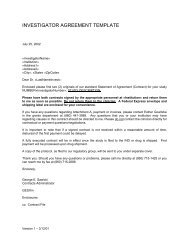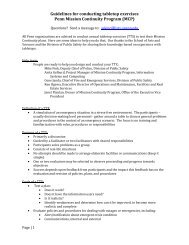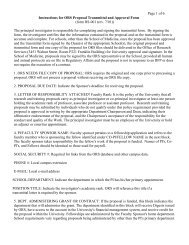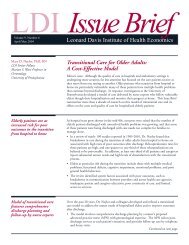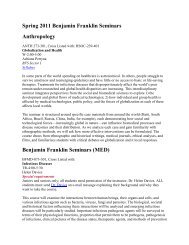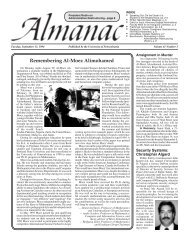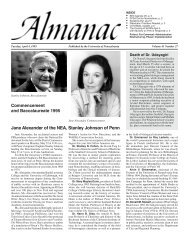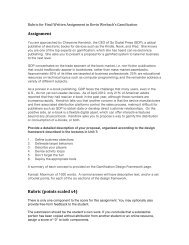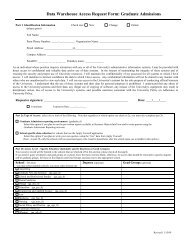Download this article (PDF) - University of Pennsylvania
Download this article (PDF) - University of Pennsylvania
Download this article (PDF) - University of Pennsylvania
Create successful ePaper yourself
Turn your PDF publications into a flip-book with our unique Google optimized e-Paper software.
46 MAY | JUNE 2011 THE PENNSYLVANIA GAZETTE | PHOTOGRAPHY BY CANDACE DICARLO<br />
PORTRAIT OF JAMES WILSON BY ALBERT ROSENTHAL, 1899, OIL ON CANVAS.<br />
COURTESY OF THE UNIVERSITY OF PENNSYLVANIA ART COLLECTION
James Wilson signed the Declaration <strong>of</strong> Independence<br />
and was a key architect <strong>of</strong> the US Constitution, helped found<br />
Penn Law School, and served as one <strong>of</strong> the first justices <strong>of</strong> the<br />
Supreme Court. He was also a reckless land-speculator—<br />
jailed more than once for debt—who died a fugitive.<br />
BY DENNIS DRABELLE<br />
THE PENNSYLVANIA GAZETTE MAY | JUNE 2011 47
Should a judge decide a case honorary Master’s Degree. Fired with they had never consented to be governed<br />
by that body.<br />
involving a law that he or she worldly ambition, however, he quit<br />
previously worked on as a legislator?<br />
The answer is obvious: John Dickinson. In 1767, after only a his personal history: “Do those, who<br />
tutoring to read law with the eminent In a flight <strong>of</strong> rhetoric, Wilson invoked<br />
48 MAY | JUNE 2011 THE PENNSYLVANIA GAZETTE<br />
<strong>of</strong> course not. What about a case calling<br />
for interpretation <strong>of</strong> the constitution<br />
that the judge had a hand in drafting?<br />
Same result, except perhaps all the<br />
more so: the judge should disqualify—<br />
or, as lawyers say, “recuse”—herself.<br />
But these are modern-day answers.<br />
Back at the dawn <strong>of</strong> the American republic,<br />
no one seemed to mind when a man<br />
served in the Continental Congress;<br />
signed the Declaration <strong>of</strong> Independence;<br />
played a central role in the writing, debating,<br />
and selling <strong>of</strong> the Constitution; took<br />
a seat on the brand-new US Supreme<br />
Court; and then helped decide cases<br />
that clarified provisions <strong>of</strong> the same<br />
Constitution. That man, who also taught<br />
Latin and law at an early incarnation <strong>of</strong><br />
Penn called the College <strong>of</strong> Philadelphia,<br />
was James Wilson. But if eyebrows failed<br />
to go up when Justice Wilson interpreted<br />
the document to which he had so heavily<br />
contributed, the same cannot be said<br />
<strong>of</strong> his <strong>of</strong>f-the-bench addiction to landspeculation.<br />
An examination <strong>of</strong> Wilson’s<br />
career—from Founding Father to fugitive<br />
from justice—sheds light on both a<br />
complex figure and a volatile phase <strong>of</strong><br />
American history.<br />
Born in 1742 on a farm near St. Andrews,<br />
Scotland, young James Wilson was so<br />
bright that his parents made sacrifices<br />
to send him to school. After preparatory<br />
studies that included Latin and Greek,<br />
he attended St. Andrews <strong>University</strong> and<br />
its divinity school, St. Mary’s College.<br />
He was on track to be a clergyman in the<br />
Church <strong>of</strong> Scotland until the death <strong>of</strong><br />
his father called for a change <strong>of</strong> plans.<br />
Rather than trudge back to the farm,<br />
however, Wilson studied accounting.<br />
Supported by loans from his family, he<br />
sailed to America in 1765, joining an<br />
exodus <strong>of</strong> promising young Scots with<br />
limited prospects in their homeland and<br />
small chance <strong>of</strong> succeeding in England<br />
unless they had connections there.<br />
Wilson alighted in Philadelphia,<br />
where he put his knowledge <strong>of</strong> the<br />
Classics to work for him by tutoring<br />
at the College; he made such a good<br />
impression that he was awarded an<br />
year <strong>of</strong> legal studies, Wilson set up practice<br />
in <strong>Pennsylvania</strong>, first in Reading<br />
and later in Carlisle. There was plenty<br />
<strong>of</strong> work to be had in sorting out land<br />
claims on the frontier, and Wilson was<br />
soon investing in real estate himself.<br />
He fell into the habit <strong>of</strong> piling up deals,<br />
pledging the anticipated pr<strong>of</strong>its from<br />
the sale <strong>of</strong> one tract as a down payment<br />
on another, until he was engaged in a<br />
perennial juggling act.<br />
He showed enough lawyerly promise,<br />
however, to be allowed to court an<br />
heiress, Rachel Bird, whose parents<br />
presided over their estate, Birdsboro,<br />
along the Schuylkill River. After some<br />
resistance, Rachel said yes. Marrying<br />
in 1771, the couple settled in Carlisle,<br />
where they had the first three <strong>of</strong> their<br />
six children. In a surviving portrait,<br />
Wilson is posed with his head turned so<br />
as to leave space between his eyes and<br />
his spectacles—an effect that seems to<br />
accentuate the sitter’s reputation for<br />
braininess. Charm was not one <strong>of</strong> his<br />
gifts, but in his day he had few rivals<br />
for erudition. As an observer at the<br />
Constitutional Convention was to note<br />
<strong>of</strong> Wilson, “All the political institutions<br />
<strong>of</strong> the World he knows in detail,<br />
and can trace the causes and effects<br />
<strong>of</strong> every revolution from the earliest<br />
stages <strong>of</strong> the Grecian commonwealth<br />
down to the present time.”<br />
Wilson shot up to prominence just<br />
as American colonists’ long-simmering<br />
resentment <strong>of</strong> British tyranny was<br />
coming to a boil. He entered politics<br />
in 1774 as a delegate to the Provincial<br />
Convention called in response to the<br />
Coercive Acts and other Parliamentary<br />
insults. Dickinson wrote the convention’s<br />
report, which assailed Parliament<br />
and urged fellow colonists not to forfeit<br />
the liberties they were entitled to<br />
as Englishmen. Wilson took a stronger<br />
line in an essay he’d been working on<br />
for some time, “Considerations on the<br />
Nature and Extent <strong>of</strong> the Legislative<br />
Authority <strong>of</strong> the British Parliament.”<br />
Applying Lockean principles, Wilson<br />
argued that Parliament had no authority<br />
whatever over the colonies because<br />
embark, freemen, in Great-Britain, disembark,<br />
slaves, in America? … Is <strong>this</strong> the<br />
return made us for leaving our friends<br />
and our country—for braving the danger<br />
<strong>of</strong> the deep—for planting a wilderness,<br />
inhabited only by savage men and savage<br />
beasts—for extending the dominion<br />
<strong>of</strong> the British Crown—for increasing<br />
the trade <strong>of</strong> British merchants—for<br />
augmenting the rents <strong>of</strong> the British<br />
landlords—for heightening the wages <strong>of</strong><br />
the British artificers?” Americans owed<br />
Britain nothing more than loyalty to the<br />
king, Wilson went on; otherwise, they<br />
should be left in charge <strong>of</strong> themselves.<br />
In the words <strong>of</strong> his biographer, Charles<br />
Page Smith, Wilson meant <strong>this</strong> rousing<br />
essay to be “his card <strong>of</strong> entry into the<br />
higher circle <strong>of</strong> colonial leaders.”<br />
He fell<br />
into the habit <strong>of</strong><br />
piling up deals,<br />
pledging the<br />
anticipated pr<strong>of</strong>its<br />
from the sale <strong>of</strong><br />
one tract as a<br />
down payment<br />
on another, until<br />
he was engaged<br />
in a perennial<br />
juggling act.
CANDACE DICARLO; UNIVERSITY ARCHIVES<br />
And a high card it was. John Adams,<br />
no fan <strong>of</strong> Dickinson’s, praised Wilson<br />
as a young man “whose fortitude, rectitude,<br />
and abilities too, greatly outshine<br />
his master’s.” Two years later, Wilson<br />
was elected (by the colonial legislature)<br />
to be one <strong>of</strong> <strong>Pennsylvania</strong>’s representatives<br />
to the second Continental<br />
Congress. In the interim, however,<br />
American politics had evolved in such<br />
a way that he now found himself in<br />
the moderate camp, not quite ready<br />
to take the step urged by the impatient<br />
Adams: a clean break with the<br />
mother country. Wilson feared that,<br />
unless well prepared for, independence<br />
might lead to the dissolution <strong>of</strong> all government,<br />
leaving Americans “instantly<br />
in a state <strong>of</strong> nature.” (It bears pointing<br />
out that a state <strong>of</strong> nature might<br />
have meant curtains for Wilson’s burgeoning<br />
land empire.) When radicals<br />
accused him <strong>of</strong> disloyalty, his fellow<br />
delegates drew up a Defense <strong>of</strong> Wilson<br />
to reassure the populace. On July 4,<br />
1776, Wilson signed the Declaration<br />
<strong>of</strong> Independence; Adams later admitted<br />
that the foot-dragging by Wilson<br />
and others might actually have been a<br />
boon, giving the people time to catch<br />
up with their fiery leaders.<br />
The post-Declaration Congress had<br />
knotty problems to work on, and Wilson<br />
attacked several <strong>of</strong> these. For example,<br />
he threw out a challenge to those small<br />
colonies, such as Rhode Island and<br />
Delaware, which sought to counter the<br />
outsized influence wielded by more populous<br />
ones: “I defy the wit <strong>of</strong> man to<br />
invent a possible case or to suggest any<br />
one thing on earth which shall be for the<br />
interests <strong>of</strong> Virginia, <strong>Pennsylvania</strong> and<br />
Massachusetts, and which shall not be<br />
also for the interests <strong>of</strong> the other states.”<br />
(He eventually changed his mind on <strong>this</strong><br />
point.) Like Adams, Wilson favored a<br />
strong central government and opposed<br />
the notion that “all sovereign power was<br />
in the States separately.” These were<br />
among many issues left unresolved, however,<br />
while Congress concentrated on waging<br />
the Revolutionary War. Meanwhile,<br />
Wilson had lost support back home.<br />
Angered by his opposition to the commonwealth’s<br />
new constitution, radicals in the<br />
<strong>Pennsylvania</strong> Assembly unseated him.<br />
Wilson used the respite to refurbish<br />
his law practice. It was time to move<br />
from provincial Carlisle to Philadelphia,<br />
where he found a niche as a defense<br />
attorney in treason cases. Although he<br />
didn’t get all his clients <strong>of</strong>f, he gained<br />
expertise that served him well a decade<br />
later, when the subject <strong>of</strong> treason came<br />
up in the national constitutional debates.<br />
Arguing that treason trials “have <strong>of</strong>ten<br />
been the most tremendous Engines <strong>of</strong><br />
despotic Power or <strong>of</strong> legislative Tyranny,”<br />
Wilson was instrumental in adding the<br />
requirement that to prove a charge <strong>of</strong><br />
treason you must have two witnesses to<br />
an overt act.<br />
Wilson helped launch Penn’s law school with a series <strong>of</strong> lectures on training American lawyers.<br />
George Washington was among the attendees at his opening talk.<br />
THE PENNSYLVANIA GAZETTE MAY | JUNE 2011 49
pragmatic, if morally repugnant, solution<br />
Among clients represented by Wilson Money”—advice that Wilson himself<br />
50 MAY | JUNE 2011 THE PENNSYLVANIA GAZETTE<br />
in these years was Benedict Arnold,<br />
still loyal and serving as military governor<br />
<strong>of</strong> Philadelphia, who had purchased<br />
an American seaman’s claim to<br />
prize money resulting from seizure <strong>of</strong><br />
a British ship. The Admiralty Court <strong>of</strong><br />
<strong>Pennsylvania</strong> had awarded the seaman a<br />
modest amount, and in his place Arnold<br />
was seeking more. The Continental<br />
Congress allowed for appeal <strong>of</strong> state<br />
admiralty-court decisions to a board <strong>of</strong><br />
commissioners, before which Wilson<br />
successfully pleaded Arnold’s cause.<br />
But <strong>Pennsylvania</strong> refused to recognize<br />
the commissioners’ authority, a timid<br />
Congress declined to back up its own<br />
creation, and the case became a symbol<br />
<strong>of</strong> governmental impotence under the<br />
Articles <strong>of</strong> Confederation. (A generation<br />
later, by which time Wilson was<br />
dead and Arnold disgraced, the original<br />
seaman finally got the extra money<br />
he thought he deserved.)<br />
While out <strong>of</strong> <strong>of</strong>fice, Wilson stayed<br />
politically active by advocating the<br />
replacement <strong>of</strong> <strong>Pennsylvania</strong>’s radically<br />
democratic constitution with one<br />
that placed more checks on legislative<br />
power. For doing so, he became the radicals’<br />
whipping boy. In Philadelphia, they<br />
rounded up a militia, which on October<br />
4, 1779, marched to the Wilson house at<br />
the corner <strong>of</strong> Walnut and Third Streets.<br />
Rachel and the children took shelter<br />
with friends, but Wilson and a band <strong>of</strong><br />
supporters converted the house into a<br />
makeshift fort. There they held <strong>of</strong>f their<br />
attackers, though not before a defender<br />
was killed by a musket ball and four militiamen<br />
died <strong>of</strong> their wounds. Afterward,<br />
Wilson lay low for a while at the estate<br />
<strong>of</strong> a friend. By March <strong>of</strong> the following<br />
year, almost everyone was eager to forget<br />
the outburst, and a general pardon<br />
was granted.<br />
All the while, Wilson continued to<br />
speculate in land. His intentions were<br />
not wholly self-serving. He saw himself<br />
as a middleman in a process that<br />
joined surplus European labor and<br />
capital with surplus American acreage,<br />
to the benefit <strong>of</strong> all. He wrote a<br />
tract in which he laid out a philosophy<br />
<strong>of</strong> land acquisition and ground rules<br />
for getting involved. The most arresting<br />
<strong>of</strong> these is “never to be in want <strong>of</strong><br />
couldn’t follow. As if he didn’t have<br />
enough on his plate already, in January<br />
<strong>of</strong> 1783 the <strong>Pennsylvania</strong> legislature<br />
returned him to Congress.<br />
Working with James Madison and<br />
Alexander Hamilton, Delegate Wilson<br />
took up the subject <strong>of</strong> taxation. While<br />
acknowledging that Americans’ experience<br />
under British rule had made<br />
them allergic to taxes, he argued necessity:<br />
unless Congress could rely on a<br />
steady source <strong>of</strong> general revenue, the<br />
Revolution might fail. The issue led to<br />
endless wrangling, the states continued<br />
to resist Congressional requests for<br />
money, and Wilson lamented the “imbecility”<br />
<strong>of</strong> the Articles <strong>of</strong> Confederation.<br />
Amid these frustrations, on April 14,<br />
1786, Rachel died.<br />
For the grieving husband, however, a<br />
riveting distraction lay ahead. In May<br />
<strong>of</strong> 1787, when a convention gathered<br />
in Philadelphia to recommend a new<br />
form <strong>of</strong> central government, Wilson was<br />
there representing <strong>Pennsylvania</strong>. One<br />
<strong>of</strong> the tasks he took on was minor but<br />
poignant. A fellow-delegate, 81-year-old<br />
Benjamin Franklin, could no longer project<br />
well enough to be an effective orator.<br />
Whenever Franklin had a prepared<br />
statement to make during what became<br />
known as the Constitutional Convention,<br />
Wilson delivered it for him.<br />
Wilson and Madison enjoyed a distinct<br />
advantage as the convention got<br />
under way. Almost alone among the<br />
delegates, they could draw on a deep<br />
knowledge <strong>of</strong> history and political theory<br />
to imagine how a federal system,<br />
with power divided among the states<br />
and the central government, might<br />
work. In Miracle at Philadelphia, her<br />
classic account <strong>of</strong> the framing <strong>of</strong> the<br />
Constitution, Catherine Drinker Bowen<br />
cites Wilson’s “brilliance” and the “telling”<br />
speeches he made. To those who<br />
objected that the people would never<br />
support a strong central government,<br />
he retorted: “Why should a national<br />
government be unpopular? Will each<br />
citizen enjoy under it less liberty or<br />
protection? Will a citizen <strong>of</strong> Delaware<br />
be degraded by becoming a citizen <strong>of</strong><br />
the United States?” He could also split<br />
differences so that the delegates could<br />
move on. It was he who pr<strong>of</strong>fered the<br />
that ended a stand<strong>of</strong>f between free<br />
and slave states: count each slave as<br />
three-fifths <strong>of</strong> a person in determining<br />
how many representatives a state is<br />
entitled to in the lower house.<br />
Wilson endorsed the Great Compromise<br />
that gave representation based on population<br />
to one chamber <strong>of</strong> the bicameral<br />
legislature (the House) and equal<br />
representation to the other (the Senate)<br />
but lost on a related point: he urged<br />
direct popular election <strong>of</strong> senators, but<br />
the convention reserved that power to<br />
the state legislatures. (Wilson’s posthumous<br />
vindication came with the adoption<br />
<strong>of</strong> the Seventeenth Amendment in<br />
1913.) He was named to the five-man<br />
Committee <strong>of</strong> Detail, which compiled<br />
the delegates’ many tentative decisions<br />
into a single draft suitable for debate.<br />
Charles Page Smith sums up Wilson’s<br />
Conventional performance <strong>this</strong> way:<br />
“The Constitution was unmistakably<br />
a cooperative venture; no one man was<br />
responsible for the final result. But<br />
Wilson … espoused more <strong>of</strong> those principles<br />
which have since become prominent<br />
features <strong>of</strong> American democracy<br />
than any other delegate.”<br />
In polished form, the new document<br />
went to the 13 states for approval. At<br />
the <strong>Pennsylvania</strong> ratifying convention,<br />
radicals protested (correctly) that<br />
the federal Constitution would undermine<br />
the state constitution for which<br />
they had fought so hard. Their chief<br />
bugbear was Wilson, who led the proratification<br />
contingent. In speeches<br />
that sometimes lasted for hours, he<br />
carefully explained what more conventional<br />
minds had a hard time understanding:<br />
that sovereignty need not<br />
be lodged solely in one place, either<br />
giving the central government excessive<br />
power or allowing the states to<br />
neuter the central government. If, as<br />
he was convinced, sovereignty inhered<br />
in the people, they could delegate it<br />
as they wished, assigning some tasks<br />
to the central government and others<br />
to the states. The lopsided final<br />
vote, 46 in favor <strong>of</strong> ratification and<br />
23 against, fails to reflect how much<br />
effort Wilson put into countering his<br />
opponents’ arguments throughout the<br />
fall <strong>of</strong> 1787. Indeed, his powers <strong>of</strong> per-
His many creditors<br />
demanded their money, and by<br />
the fall <strong>of</strong> 1796 Wilson was in<br />
desperate straits—so changed,<br />
friends noted with dismay, that his<br />
powerful mind could find solace<br />
only in reading novels!<br />
suasion almost cost him dearly. At a<br />
post-victory rally in Carlisle, he was<br />
knocked to the ground; only the timely<br />
intervention <strong>of</strong> a war veteran, who<br />
threw himself on top <strong>of</strong> Wilson, saved<br />
him from a severe beating or worse.<br />
Wilson brashly wrote the incoming<br />
president, George Washington, to<br />
recommend himself for chief justice<br />
<strong>of</strong> the new Supreme Court. Instead,<br />
Washington chose John Jay, naming<br />
Wilson as one <strong>of</strong> the five associate justices.<br />
When someone questioned even<br />
that lesser appointment in light <strong>of</strong><br />
Wilson’s reputation as a reckless speculator,<br />
Wilson’s fellow-<strong>Pennsylvania</strong>n<br />
Benjamin Rush replied, “But where<br />
will you find an American landholder<br />
free from embarrassments?”<br />
Ever bustling, the new associate<br />
justice helped launch what became<br />
Penn Law School with a series <strong>of</strong> lectures<br />
starting in December <strong>of</strong> 1789.<br />
The federal government was then<br />
headquartered in Philadelphia, and<br />
Wilson gave his opening talk to a stellar<br />
audience that included President<br />
Washington. Wilson’s subject was how<br />
to train American lawyers in a uniquely<br />
American brand <strong>of</strong> law, couched in<br />
plain language accessible to any educated<br />
person. The following spring, he<br />
had to cut his lecture program short<br />
and shoulder one <strong>of</strong> a Supreme Court<br />
justice’s duties at the time: hearing<br />
cases on the federal circuits. He remarried<br />
(his bride, Hannah Gray, was<br />
younger than his two eldest children)<br />
and became a father for the seventh<br />
time. On top <strong>of</strong> all <strong>this</strong>, he continued to<br />
traffic in land.<br />
Although the Court as a whole had<br />
little to do during his tenure, one case,<br />
Chisholm v. Georgia (1793), raised an<br />
issue Wilson cared deeply about: can<br />
a state plead sovereign immunity to<br />
avoid being sued in federal court by<br />
a citizen <strong>of</strong> another state? The Court<br />
said no, and in a concurring opinion<br />
Wilson pointed out that a greater issue<br />
was at stake: “do the people <strong>of</strong> the<br />
United States form a nation?” To him,<br />
<strong>of</strong> course, the answer was a resounding<br />
yes—nation-forming was the goal he’d<br />
kept uppermost in mind during the<br />
Constitutional Convention.<br />
Chisholm raised enough <strong>of</strong> a ruckus<br />
among states-rights advocates that<br />
two years later it was overruled by<br />
the Eleventh Amendment. But the<br />
grounds for attacking the decision did<br />
not include the allegation that some <strong>of</strong><br />
the justices who made it were compromised<br />
by their political pasts. (Indeed,<br />
one way to look at the matter is to consider<br />
Wilson the ideal interpreter <strong>of</strong> a<br />
document that bore so many <strong>of</strong> his fingerprints.<br />
Besides, many <strong>of</strong> the ablest<br />
American lawyers had played roles in<br />
making the Constitution; it would have<br />
been a pity—perhaps even foolish—to<br />
preclude them all from having a say in<br />
how it worked in practice.)<br />
In “tragic” has been cheapened<br />
recent decades, the adjective<br />
by being applied to anything more than<br />
usually sad. But the last act <strong>of</strong> Wilson’s<br />
life was tragic in the original Greek<br />
sense: betrayed by flaws in his own<br />
character, an illustrious man suffers<br />
a dreadful fall from grace. In Wilson’s<br />
case, the precipitating event was the<br />
bursting <strong>of</strong> the first American landbubble.<br />
His many creditors demanded<br />
their money, and by the fall <strong>of</strong> 1796<br />
Wilson was in desperate straits—so<br />
changed, friends noted with dismay,<br />
that his powerful mind could find solace<br />
only in reading novels!<br />
This was an era in which chronic<br />
debtors weren’t just bumblers, but<br />
criminals, and Wilson—still a sitting<br />
Supreme Court justice—was jailed in<br />
Philadelphia. Early in 1797, it happened<br />
again, <strong>this</strong> time in New Jersey. Upon<br />
his release, Wilson, who had understandably<br />
developed a morbid fear <strong>of</strong><br />
imprisonment, fled to North Carolina.<br />
The slowness <strong>of</strong> the mails compounded<br />
his anxiety. He kept firing <strong>of</strong>f letters<br />
to his son Bird, demanding that the<br />
young man take <strong>this</strong> or that step to<br />
sort out his father’s chaotic affairs, not<br />
realizing that conditions had changed<br />
in the meantime or how destitute the<br />
Wilson family had become. Back in<br />
Philadelphia, there was talk <strong>of</strong> impeachment.<br />
When Hannah went south to join<br />
her husband in March <strong>of</strong> 1798, she<br />
found him holed up in a room above a<br />
tavern. Haggard, depressed, and confused,<br />
he clung to the illusion that if<br />
he could just round up some cash, his<br />
troubles would be over. In July, he came<br />
down with malaria. He was recovering<br />
and devising new schemes to get out <strong>of</strong><br />
debt when he had a stroke. On August<br />
21, at age 56, he died.<br />
Wilson was buried in North Carolina,<br />
where disgrace hovered over his grave.<br />
Not until 1906 were his remains dug<br />
up and re-interred at Christ Church in<br />
Philadelphia. His shabby end has long<br />
overshadowed his accomplishments,<br />
but today, as a people who have just run<br />
afoul <strong>of</strong> another real-estate bubble, we<br />
can perhaps be more forgiving.◆<br />
Dennis Drabelle G’66 L’69 is a contributing editor<br />
<strong>of</strong> The Washington Post Book World.<br />
THE PENNSYLVANIA GAZETTE MAY | JUNE 2011 51




